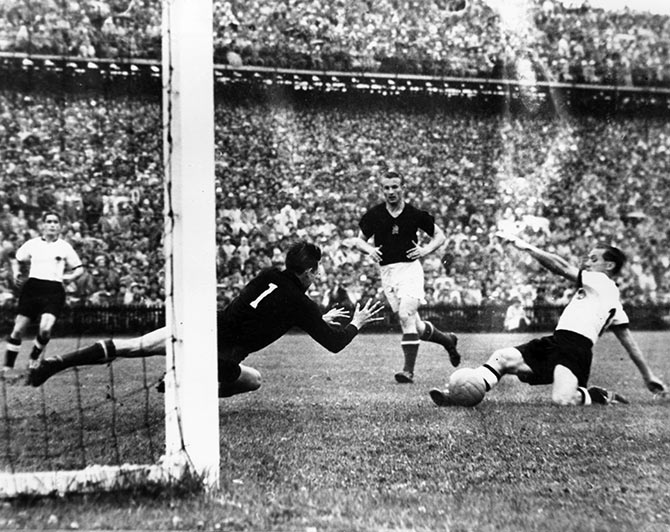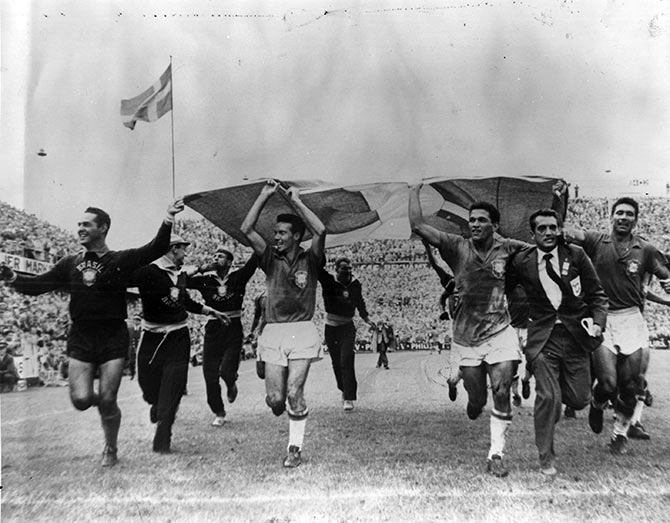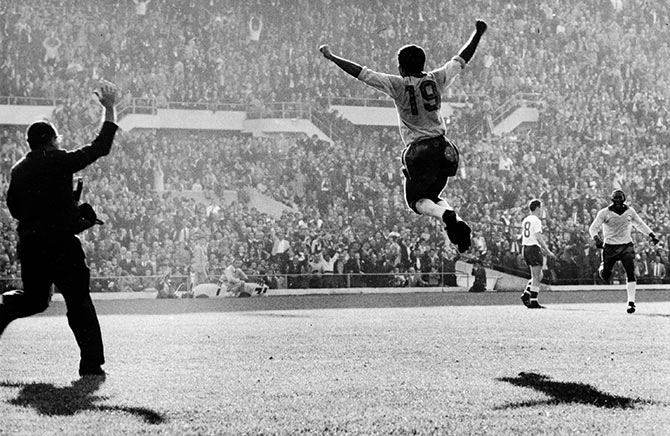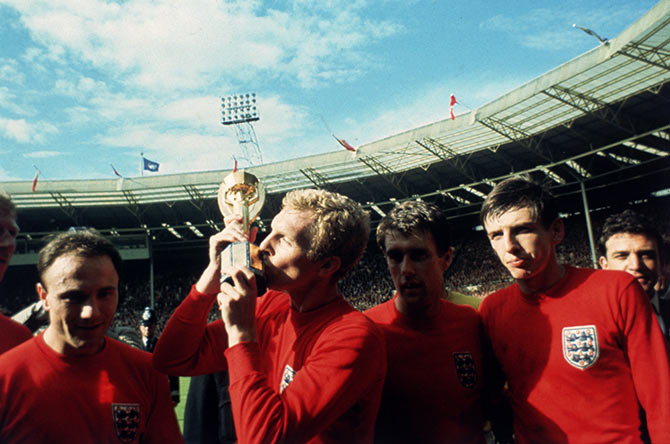 | « Back to article | Print this article |
Classic moments from the Football World Cup (1954 to 1966)
The second of a five part history of the World Cup from Uruguay in 1930 up to the preparations for the 2014 finals in Brazil.
Switzerland 1954
Final: July 4 1954: Wankdorf Stadium, Berne
WEST GERMANY 3 HUNGARY 2
Attendance: 60,000
Olympic champions Hungary were the overwhelming favourites for the tournament as they came into the finals unbeaten in 30 international matches and boasting a team that included Ferenc Puskas, Jozsef Bozsik, Sandor Kocsis and Nandor Hidegkuti.
In the previous six months they became the first continental team to beat England at Wembley, winning 6-3, before thrashing them 7-1 in Budapest, and had redefined tactics with a deep-lying centre-forward and a prototype "total football" game with players moving all over the pitch.
Hungary started the finals with thumping 9-0 and 8-3 victories over South Korea and West Germany respectively, before their involvement in the infamous "Battle of Berne" with Brazil.
Three players were sent off and the teams fought in the dressing rooms afterwards, but a 4-2 win for Hungary set up a semi-final with reigning champions Uruguay, which ended in another 4-2 success.
Goals were in abundance throughout the tournament, and in addition to Hungary's hefty wins over South Korea and the Germans, Turkey thrashed South Korea 7-0, West Germany beat Turkey 7-2 and Uruguay demolished Scotland 7-0.
Austria beat Switzerland 7-5 in the quarter-finals with all 12 goals coming in a period of 60 minutes as the 26 matches produced 140 goals with an all-time high average of 5.4 goals a game.
West Germany though, back in the World Cup for the first time following World War Two, were no pushovers despite their group stage thrashing by Hungary and made it to the final with a 6-1 win over Austria in the semi-finals.
Hungary played some outstanding football throughout the tournament and started brilliantly in the final too, leading West Germany 2-0 after eight minutes with goals from Puskas and Zoltan Czibor.
Undeterred, the Germans made it 2-2 by the 18th minute thanks to goals from Max Morlock and Helmut Rhan. But with six minutes remaining, Rhan struck the winner to complete the biggest ever upset in the final.
Brazil won the trophy for the first time in 1958
Sweden 1958
Final: June 19 1958: Rasunda Stadium, Stockholm
BRAZIL 5 SWEDEN 2
Attendance: 49,737
Widely regarded as the first "modern" World Cup, the influence of TV was growing with more people seeing the matches than ever before.
There were 16 finalists for the first time and they played in four groups of four during the opening phase, before heading into a knockout competition from the quarter-final stages onwards.
England had high hopes at the start of the year but the Manchester United air crash in Munich in February 1958 cost the lives of Roger Byrne, Tommy Taylor and Duncan Edwards, and without those tragic losses they went out in the first phase after a 1-0 playoff defeat to the Soviet Union.
Brazil won the trophy for the first time with the 17-year-old Pele launched on his way to becoming the greatest player of all time.
Pele scored against Wales in the quarter-finals and hit a hat-trick in a 5-2 win over France in the semi-finals, whose striker Just Fontaine scored 13 goals in the tournament, a record total for a World Cup finals.
Brazil triumphed 5-2 over Sweden in the final, with Vava and Pele scoring twice and Zagalo netting once, while Nils Liedholm and Agne Simonsson scored for the hosts.
'Brazil were the deserved champions'
Chile 1962
FINAL: June 17 1962: Estadio Nacional, Santiago
BRAZIL 3, CZECHOSLOVAKIA 1
Attendance: 68,679
Chile had been ravaged by a huge earthquake in 1960 which left thousands of buildings beyond repair. FIFA considered moving the tournament but Chilean FA president Carlos Dittborn famously pleaded: "We must have the World Cup because we have nothing else," and the tournament went ahead.
It resulted in another Brazilian triumph, though Pele played in only the opening game -- scoring a superb goal in a 2-0 victory over Mexico -- before injury sidelined him.
Brazil beat Czechoslovakia 3-1 in the final with goals from Amarildo, Zito and Vava after 1962 European Footballer of the Year Josef Masopust had put the eastern Europeans ahead.
"I dreamed all my life of winning the World Cup and for a few minutes after we went ahead I thought that dream was going to come true" Masopust told Reuters in an interview in 2013, "but in the end Brazil were the deserved champions."
The tournament featured the notorious "Battle of Santiago" between Italy and Chile in which two Italians were sent off and one had his nose broken by a left hook from a Chilean player.
Hurst's hat-trick lifted England to World Cup victory in 1966
England 1966
Final: July 30 1966: Wembley Stadium, London
ENGLAND 4 WEST GERMANY 2
Attendance: 92,000
The hosts triumphed again after the trophy was stolen while on display at an exhibition in London. It was recovered by a dog called Pickles under a bush in a London garden a few days later.
Pele was again battered, this time by Bulgaria's defence in the group stages as Brazil's bid for a hat-trick faltered.
North Korea entered folklore with their 1-0 win over Italy with the only goal scored by Pak Do Ik, and for leading Portugal 3-0 in the quarter-finals before losing 5-3.
Portugal's Eusebio, who struck four times in that match, and who died earlier this year, finished as top scorer with nine goals.
England beat West Germany 4-2 after extra time in a thrilling final at Wembley where Geoff Hurst made history by becoming the first, and so far only player, to score a hat-trick in the final.
His second goal, England's third, remains controversial and after 48 years a debate still rages about whether the ball crossed the line after bouncing down from the crossbar.
For the fifth successive final, the team that scored first lost. Helmut Haller put Germany ahead before Hurst drew the scores level.
Martin Peters put England back in front before Wolfgang Weber's last-minute equaliser sent the game into extra time when Hurst scored twice more.



